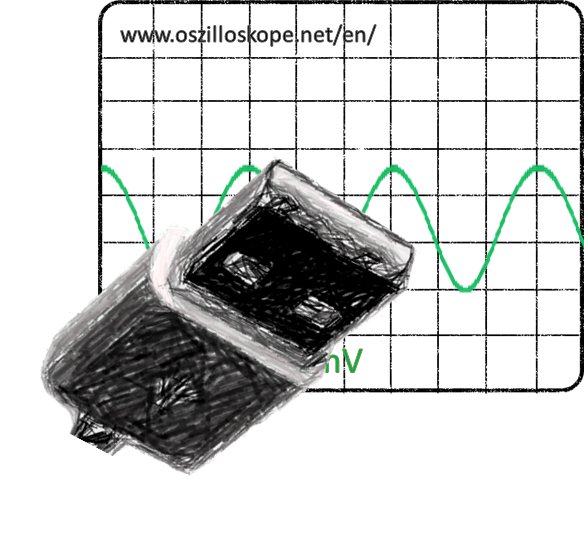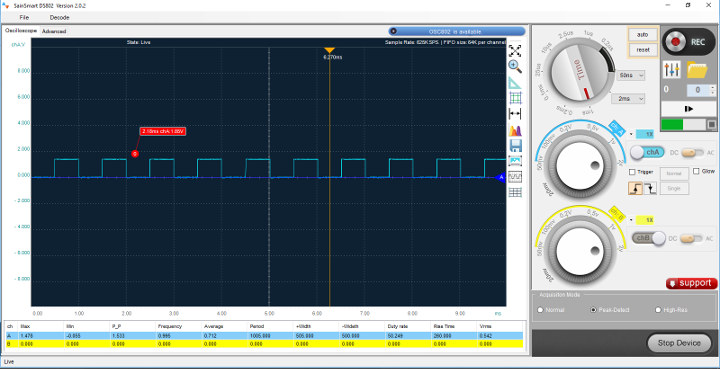

- #Sainsmart oscilloscope use on linux generator#
- #Sainsmart oscilloscope use on linux software#
USB port: Mini-USB style (rather than the slightly more popular micro-USB style) connector.CH-D: Digital channel 4, mxc-style connector.CH-C: Digital channel 3, mxc-style connector.CH-A: Analog channel 1, mcx-style connector.CH-B: Analog channel 2, mcx-style connector.
#Sainsmart oscilloscope use on linux generator#
WAVE OUT: Signal generator output, mcx-style connector.
 NAV-B: Also known as "" or Navigator B (this momentary-press switch can be pushed left or right and the middle can be pressed down). NAV-A: Also known as "-.v.+" or Navigator A (this momentary-press switch can be pushed left or right and the momentary-press middle can be pressed down as a toggle). K4: Also known as TRIANGLE or Save Wave (this is a momentary-press toggle button). K3: Also known as RECORD or Preset (this is a momentary-press toggle button, toggling this often brings up a popup display which is sometimes signal details). K2: Also known as STOP or Calibrate (this is a momentary-press toggle button). K1: Also known as PLAY or Run/Hold (this is a momentary-press toggle button). Note that ElecHouse's button listing on their p5 incorrectly labels CH-A and CH-B locations. There appear to be short-press and long-press versions of the K1-K4 controls which perform different functions. The following controls are broken down by side of the oscilloscope, as held vertically to face the LCD screen. Max input voltage of logic probe: +/- 15V peak valueįrom 's website (PDF, 13 pages)įrom 's website (PDF, 29 pages) Interface and Controls. Max transient-withstanding voltage: +/- 400V peak value. Humidity requirements: Operating (10-60% RH), Non-operating (5-60 % RH). Temperature requirements: Operating (0°-50☌), Non-operating (-20° - +60☌). Processor: ARM cortex M3 (STM32VCT6) 32-bits with integrated FPGA and high-speed ADC. Weight without battery: 80g (shipping weight 1.2lbs). Display modes: CH1, CH2, EXT, CH1 + CH2, CH1 - CH2, CH1 * CH2. Auto measure: Vmax (maximum voltage), Vmin (minimum voltage), Vpp (Peak-to-peak voltage), Vavr, Vrms (Average value of voltage), Freq (signal frequency), Period, Pulse, Duty cycle, Vdc (direct current voltage), Vbt, FPS (frames Per Second). Signal generator: 10Hz to 1Mhz (square, sin, sawtooth, triangle) Reported as 10-20K Hz in ElecHouse's manual.
NAV-B: Also known as "" or Navigator B (this momentary-press switch can be pushed left or right and the middle can be pressed down). NAV-A: Also known as "-.v.+" or Navigator A (this momentary-press switch can be pushed left or right and the momentary-press middle can be pressed down as a toggle). K4: Also known as TRIANGLE or Save Wave (this is a momentary-press toggle button). K3: Also known as RECORD or Preset (this is a momentary-press toggle button, toggling this often brings up a popup display which is sometimes signal details). K2: Also known as STOP or Calibrate (this is a momentary-press toggle button). K1: Also known as PLAY or Run/Hold (this is a momentary-press toggle button). Note that ElecHouse's button listing on their p5 incorrectly labels CH-A and CH-B locations. There appear to be short-press and long-press versions of the K1-K4 controls which perform different functions. The following controls are broken down by side of the oscilloscope, as held vertically to face the LCD screen. Max input voltage of logic probe: +/- 15V peak valueįrom 's website (PDF, 13 pages)įrom 's website (PDF, 29 pages) Interface and Controls. Max transient-withstanding voltage: +/- 400V peak value. Humidity requirements: Operating (10-60% RH), Non-operating (5-60 % RH). Temperature requirements: Operating (0°-50☌), Non-operating (-20° - +60☌). Processor: ARM cortex M3 (STM32VCT6) 32-bits with integrated FPGA and high-speed ADC. Weight without battery: 80g (shipping weight 1.2lbs). Display modes: CH1, CH2, EXT, CH1 + CH2, CH1 - CH2, CH1 * CH2. Auto measure: Vmax (maximum voltage), Vmin (minimum voltage), Vpp (Peak-to-peak voltage), Vavr, Vrms (Average value of voltage), Freq (signal frequency), Period, Pulse, Duty cycle, Vdc (direct current voltage), Vbt, FPS (frames Per Second). Signal generator: 10Hz to 1Mhz (square, sin, sawtooth, triangle) Reported as 10-20K Hz in ElecHouse's manual. #Sainsmart oscilloscope use on linux software#
Software trigger type: edge, pulse (auto, normal, single, scan, none). Max input voltage: 80Vpp (with X1 probe). Horizontal sensitivity: 0.1µS/division - approximately 1S/division. Vertical scale: 20mV-10V/division (using X1 probe). 2 Mueller mcx oscilloscope probes included (X1, X10). Four programmable spaces for user applications, open-source. Digital storage of data with HOLD for analysis (with memory depth of 4K/channel, 2MB internal USB disk, optionally 8MB) with playback. User-upgradeable firmware via USB tethering to include some customization. 4 channels (two digital - CH C/D, two analog - CH A/B). Battery-powered, portable, pocket-sized. Instructions for using the SainSmart Mini DSO DS203 pocket-sized oscilloscope (the unauthorized manual)






 0 kommentar(er)
0 kommentar(er)
